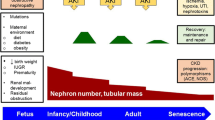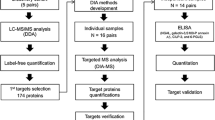Abstract
Non-invasive prognosis of the clinical progression of disease is of high interest, especially in newborn and children. Neonatal ureteropelvic (UPJ) junction obstruction needs close and invasive surveillance to determine the necessity of pyeloplasty. A number of groups have initiated research with the aim to find non-invasive biomarkers for UPJ obstruction. Two different strategies have been followed. One strategy, based on the knowledge obtained in animal models of UPJ obstruction, has identified a number of individual urinary markers of severe UPJ obstruction. Combining these markers might allow prediction of which patients will require surgery and in which patients UPJ obstruction will spontaneously resolve. The other strategy is based on urinary proteomics. In this strategy the entire urinary proteome is probed for a set of biomarkers that correlates with the degree of UPJ obstruction. In subsequent steps, these sets of urinary biomarkers are used for prediction of the clinical evolution of UPJ obstruction patients. This proteomic-based strategy allowed prediction, several months in advance, of the clinical evolution of neonates with UPJ-obstruction. Both strategies will be complementary and will hopefully replace in the near future the invasive follow-up of newborns with UPJ obstruction.



Similar content being viewed by others
References
Chang CP, McDill BW, Neilson JR, Joist HE, Epstein JA, Crabtree GR, Chen F (2004) Calcineurin is required in urinary tract mesenchyme for the development of the pyeloureteral peristaltic machinery. J Clin Invest 113:1051–1058
Zhang PL, Peters CA, Rosen S (2000) Ureteropelvic junction obstruction: morphological and clinical studies. Pediatr Nephrol 14:820–826
Bascands JL, Schanstra JP (2005) Obstructive nephropathy: insights from genetically engineered animals. Kidney Int 68:925–937
Nishimura H, Yerkes E, Hohenfellner K, Miyazaki Y, Ma J, Hunley TE, Yoshida H, Ichiki T, Threadgill D, Phillips JA III, Hogan BM, Fogo A, Brock JW III, Inagami T, Ichikawa I (1999) Role of the angiotensin type 2 receptor gene in congenital anomalies of the kidney and urinary tract, CAKUT, of mice and men. Mol Cell 3:1–10
Matsusaka T, Miyazaki Y, Ichikawa I (2002) The renin angiotensin system and kidney development. Annu Rev Physiol 64:551–561
Csaicsich D, Greenbaum LA, Aufricht C (2004) Upper urinary tract: when is obstruction obstruction? Curr Opin Urol 14:213–217
Chevalier RL, Peters CA (2003) Congenital urinary tract obstruction: proceedings of the state-of-the-art strategic planning workshop-national institutes of health, Bethesda, Maryland, USA, 11-12 March 2002. Pediatr Nephrol 18:576–606
Huang WY, Peters CA, Zurakowski D, Borer JG, Diamond DA, Bauer SB, McLellan DL, Rosen S (2006) Renal biopsy in congenital ureteropelvic junction obstruction: evidence for parenchymal maldevelopment. Kidney Int 69:137–143
Chevalier RL, Thornhill BA, Chang AY (2000) Unilateral ureteral obstruction in neonatal rats leads to renal insufficiency in adulthood. Kidney Int 58:1987–1995
Thornhill BA, Burt LE, Chen C, Forbes MS, Chevalier RL (2005) Variable chronic partial ureteral obstruction in the neonatal rat: a new model of ureteropelvic junction obstruction. Kidney Int 67:42–52
Chevalier RL (2006) Pathogenesis of renal injury in obstructive uropathy. Curr Opin Pediatr 18:153–160
Furness PD III, Maizels M, Han SW, Cohn RA, Cheng EY (1999) Elevated bladder urine concentration of transforming growth factor-beta1 correlates with upper urinary tract obstruction in children. J Urol 162:1033–1036
Grandaliano G, Gesualdo L, Bartoli F, Ranieri E, Monno R, Leggio A, Paradies G, Caldarulo E, Infante B, Schena FP (2000) MCP-1 and EGF renal expression and urine excretion in human congenital obstructive nephropathy. Kidney Int 58:182–192
El-Sherbiny MT, Mousa OM, Shokeir AA, Ghoneim MA (2002) Role of urinary transforming growth factor-beta1 concentration in the diagnosis of upper urinary tract obstruction in children. J Urol 168:1798–1800
Taha MA, Shokeir AA, Osman HG, Abd el-Aziz Ael A, Farahat SE (2007) Diagnosis of ureteropelvic junction obstruction in children: role of endothelin-1 in voided urine. Urology 69:560–564; discussion 564–565
Taha MA, Shokeir AA, Osman HG, Abd El-Aziz Ael A, Farahat SE (2007) Pelvi-ureteric junction obstruction in children: the role of urinary transforming growth factor-beta and epidermal growth factor. BJU Int 99:899–903
Chevalier RL (2006) Obstructive nephropathy: towards biomarker discovery and gene therapy. Nat Clin Pract Nephrol 2:157–168
Valles PG, Pascual L, Manucha W, Carrizo L, Ruttler M (2003) Role of endogenous nitric oxide in unilateral ureteropelvic junction obstruction in children. Kidney Int 63:1104–1115
Liu Y (2006) Renal fibrosis: new insights into the pathogenesis and therapeutics. Kidney Int 69:213–217
Kaneto H, Morrissey J, Klahr S (1993) Increased expression of TGF-beta 1 mRNA in the obstructed kidney of rats with unilateral ureteral ligation. Kidney Int 44:313–321
Seremetis GM, Maizels M (1996) TGF-beta mRNA expression in the renal pelvis after experimental and clinical ureteropelvic junction obstruction. J Urol 156:261–266
Wright EJ, McCaffrey TA, Robertson AP, Vaughan ED Jr, Felsen D (1996) Chronic unilateral ureteral obstruction is associated with interstitial fibrosis and tubular expression of transforming growth factor-beta. Lab Invest 74:528–537
Honkanen E, Teppo AM, Tornroth T, Groop PH, Gronhagen-Riska C (1997) Urinary transforming growth factor-beta 1 in membranous glomerulonephritis. Nephrol Dial Transplant 12:2562–2568
Haramaki R, Tamaki K, Fujisawa M, Ikedo H, Haramaki N, Okuda S (2001) Steroid therapy and urinary transforming growth factor-beta1 in IgA nephropathy. Am J Kidney Dis 38:1191–1198
De Muro P, Faedda R, Fresu P, Masala A, Cigni A, Concas G, Mela MG, Satta A, Carcassi A, Sanna GM, Cherchi GM (2004) Urinary transforming growth factor-beta 1 in various types of nephropathy. Pharmacol Res 49:293–298
Cha DR, Kim IS, Kang YS, Han SY, Han KH, Shin C, Ji YH, Kim NH (2005) Urinary concentration of transforming growth factor-beta-inducible gene-h3 (beta ig-h3) in patients with type 2 diabetes mellitus. Diabet Med 22:14–20
Tsakas S, Goumenos DS (2006) Accurate measurement and clinical significance of urinary transforming growth factor-beta1. Am J Nephrol 26:186–193
Kaneto H, Morrissey J, McCracken R, Reyes A, Klahr S (1994) Enalapril reduces collagen type IV synthesis and expansion of the interstitium in the obstructed rat kidney. Kidney Int 45:1637–1647
Leonard EJ, Yoshimura T (1990) Human monocyte chemoattractant protein-1 (MCP-1). Immunol Today 11:97–101
Diamond JR, Kees-Folts D, Ding G, Frye JE, Restrepo NC (1994) Macrophages, monocyte chemoattractant peptide-1, and TGF-beta 1 in experimental hydronephrosis. Am J Physiol 266:F926–F933
Wada T, Furuichi K, Sakai N, Iwata Y, Kitagawa K, Ishida Y, Kondo T, Hashimoto H, Ishiwata Y, Mukaida N, Tomosugi N, Matsushima K, Egashira K, Yokoyama H (2004) Gene therapy via blockade of monocyte chemoattractant protein-1 for renal fibrosis. J Am Soc Nephrol 15:940–948
Grandaliano G, Gesualdo L, Ranieri E, Monno R, Montinaro V, Marra F, Schena FP (1996) Monocyte chemotactic peptide-1 expression in acute and chronic human nephritides: a pathogenetic role in interstitial monocytes recruitment. J Am Soc Nephrol 7:906–913
Eardley KS, Zehnder D, Quinkler M, Lepenies J, Bates RL, Savage CO, Howie AJ, Adu D, Cockwell P (2006) The relationship between albuminuria, MCP-1/CCL2, and interstitial macrophages in chronic kidney disease. Kidney Int 69:1189–1197
Josephson S, Hemsen A (1994) Renal tissue endothelin in long-term complete ureteric obstruction in the young rat. Urol Int 53:57–61
Feldman DL, Mogelesky TC, Chou M, Jeng AY (2000) Enhanced expression of renal endothelin-converting enzyme-1 and endothelin-A-receptor mRNA in rats with interstitial fibrosis following ureter ligation. J Cardiovasc Pharmacol 36:S255–S259
Kelleher JP, Shah V, Godley ML, Wakefield AJ, Gordon I, Ransley PG, Snell ME, Risdon RA (1992) Urinary endothelin (ET1) in complete ureteric obstruction in the miniature pig. Urol Res 20:63–65
Hegarty NJ, Young LS, O'Neill AJ, Watson RW, Fitzpatrick JM (2003) Endothelin in unilateral ureteral obstruction: vascular and cellular effects. J Urol 169:740–744
Storch S, Saggi S, Megyesi J, Price PM, Safirstein R (1992) Ureteral obstruction decreases renal prepro-epidermal growth factor and Tamm-Horsfall expression. Kidney Int 42:89–94
Chung KH, Chevalier RL (1996) Arrested development of the neonatal kidney following chronic ureteral obstruction. J Urol 155:1139–1144
Ranieri E, Gesualdo L, Petrarulo F, Schena FP (1996) Urinary IL-6/EGF ratio: a useful prognostic marker for the progression of renal damage in IgA nephropathy. Kidney Int 50:1990–2001
Thongboonkerd V, Malasit P (2005) Renal and urinary proteomics: current applications and challenges. Proteomics 5:1033–1042
Schaub S, Wilkins J, Weiler T, Sangster K, Rush D, Nickerson P (2004) Urine protein profiling with surface-enhanced laser-desorption/ionization time-of-flight mass spectrometry. Kidney Int 65:323–332
Thongboonkerd V, Chutipongtanate S, Kanlaya R (2006) Systematic evaluation of sample preparation methods for gel-based human urinary proteomics: quantity, quality, and variability. J Proteome Res 5:183–191
Traum AZ, Wells MP, Aivado M, Libermann TA, Ramoni MF, Schachter AD (2006) SELDI-TOF MS of quadruplicate urine and serum samples to evaluate changes related to storage conditions. Proteomics 6:1676–1680
Thongboonkerd V, McLeish KR, Arthur JM, Klein JB (2002) Proteomic analysis of normal human urinary proteins isolated by acetone precipitation or ultracentrifugation. Kidney Int 62:1461–1469
Henzel WJ, Watanabe C, Stults JT (2003) Protein identification: the origins of peptide mass fingerprinting. J Am Soc Mass Spectrom 14:931–942
Issaq HJ, Conrads TP, Prieto DA, Tirumalai R, Veenstra TD (2003) SELDI-TOF MS for diagnostic proteomics. Anal Chem 75:148A–155A
Woroniecki RP, Orlova TN, Mendelev N, Shatat IF, Hailpern SM, Kaskel FJ, Goligorsky MS, O'Riordan E (2006) Urinary proteome of steroid-sensitive and steroid-resistant idiopathic nephrotic syndrome of childhood. Am J Nephrol 26:258–267
Khurana M, Traum AZ, Aivado M, Wells MP, Guerrero M, Grall F, Libermann TA, Schachter AD (2006) Urine proteomic profiling of pediatric nephrotic syndrome. Pediatr Nephrol 21:1257–1265
Mosley K, Tam FW, Edwards RJ, Crozier J, Pusey CD, Lightstone L (2006) Urinary proteomic profiles distinguish between active and inactive lupus nephritis. Rheumatology (Oxford) 45:1497–1504
Clarke W, Silverman BC, Zhang Z, Chan DW, Klein AS, Molmenti EP (2003) Characterization of renal allograft rejection by urinary proteomic analysis. Ann Surg 237:660–664; discussion 664–665
O'Riordan E, Orlova TN, Mei JJ, Butt K, Chander PM, Rahman S, Mya M, Hu R, Momin J, Eng EW, Hampel DJ, Hartman B, Kretzler M, Delaney V, Goligorsky MS (2004) Bioinformatic analysis of the urine proteome of acute allograft rejection. J Am Soc Nephrol 15:3240–3248
Kolch W, Neususs C, Pelzing M, Mischak H (2005) Capillary electrophoresis-mass spectrometry as a powerful tool in clinical diagnosis and biomarker discovery. Mass Spectrom Rev 24:959–977
Decramer S, Wittke S, Mischak H, Zurbig P, Walden M, Bouissou F, Bascands JL, Schanstra JP (2006) Predicting the clinical outcome of congenital unilateral ureteropelvic junction obstruction in newborn by urinary proteome analysis. Nat Med 12:398–400
Theodorescu D, Wittke S, Ross MM, Walden M, Conaway M, Just I, Mischak H, Frierson HF (2006) Discovery and validation of new protein biomarkers for urothelial cancer: a prospective analysis. Lancet Oncol 7:230–240
Chertin B, Pollack A, Koulikov D, Rabinowitz R, Hain D, Hadas-Halpren I, Farkas A (2006) Conservative treatment of ureteropelvic junction obstruction in children with antenatal diagnosis of hydronephrosis: lessons learned after 16 years of follow-up. Eur Urol 49:734–738; discussion 739
Eyre D (2002) Collagen of articular cartilage. Arthritis Res 4:30–35
Cochrane AL, Kett MM, Samuel CS, Campanale NV, Anderson WP, Hume DA, Little MH, Bertram JF, Ricardo SD (2005) Renal structural and functional repair in a mouse model of reversal of ureteral obstruction. J Am Soc Nephrol 16:3623–3630
Acknowledgments
This work was supported by grants from the Clinical Research Hospital Program from the French Ministry of Health (PHRC 2004) and from the “Fondation pour la Recherche Médicale” call “Development and therapy for kidney diseases”. Regulatory and ethic submission was sponsored by University Hospital of Toulouse. The work of J.P. Schanstra was supported by Inserm and the “Direction Régional de la Recherche” (CHU de Toulouse) under the Interface programme.
Author information
Authors and Affiliations
Corresponding author
Rights and permissions
About this article
Cite this article
Decramer, S., Bascands, JL. & Schanstra, J.P. Non-invasive markers of ureteropelvic junction obstruction. World J Urol 25, 457–465 (2007). https://doi.org/10.1007/s00345-007-0201-8
Received:
Accepted:
Published:
Issue Date:
DOI: https://doi.org/10.1007/s00345-007-0201-8




